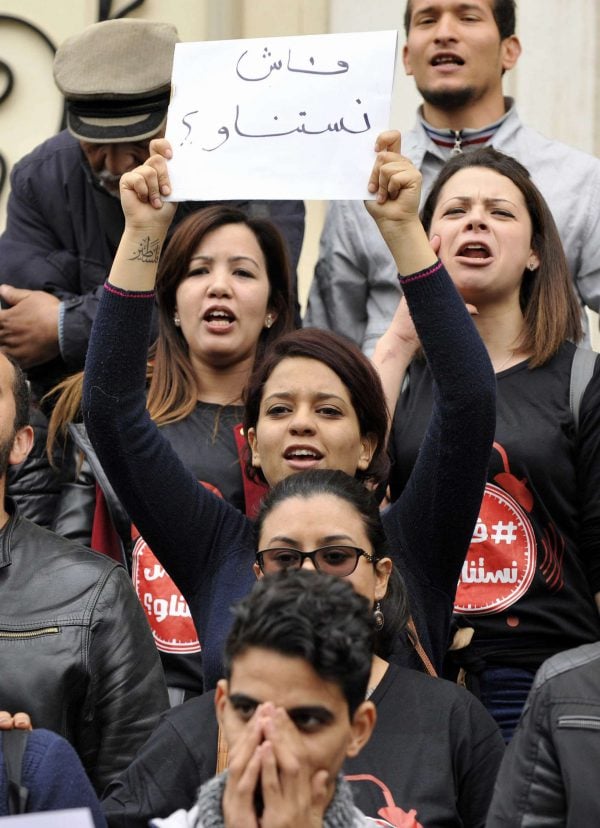
On December 17,2010, Mohammed Bouazizi, a street vendor in Sidi Bouzid, Tunisia, set himself on fire and ignited Tunisia’s Jasmine Revolution. It was a desperate act that lit the sky and the world. His act reflected a general sense of despair, and in that reflected despair, people saw transformative change as their only hope. Within a month, on January 14, 2011, President Zine El Abidine Ben Ali dissolved his government. From its first flicker, the Jasmine Revolution was more than the ouster of a dictator. It was an assault on patriarchy that emerged from decades of women and youth organizing. Seven years later, it still is. Ask the women who have ignited the current wave of protests across Tunisia, protests that demand a practical, material response to their question: “Fech Nestannew?” “What are we waiting for?” “Qu’attendons-nous?” “فاش نستناو ؟”
For Tunisia, the past seven years have been “interesting,” and particularly for women. The government has seesawed repeatedly on its position vis-à-vis women’s rights, equality, and roles. The State and parts of Civil Society have colluded in trying to diminish the significance of women’s work and contributions. And women have pushed back. In this last round of push-back, women have responded to an IMF-imposed budget, agreed on in December and implemented as of January 1. This budget follows the tried and true, or better failed and false, austerity menu: increase taxes, slice subsidies, subject the civil service to “efficiencies”, raise food prices, stop recruiting and hiring for public sector jobs. The IMF declared the new budget is bold and ambitious. Tunisian women thought otherwise. They asked, “When do we get the jobs we struggled for and were promised? When will food become generally affordable? Where is our housing? What are we waiting for?” Women demanded a better menu than that offered by the IMF: “Travail, pain, liberté et dignité” “Employment, bread, liberty, and dignity”.
The Fech Nestannew? movement describes itself as horizontal, but it does have spokespeople, most notably Henda Chennaoui and Warda Atig. Warda Atig explained that Fech Nestannew? activists held their first action on January 3: “We were waiting for the government to make the law official and we chose the date of our first action to be January 3. The date is very symbolic because, on January 3, 1984, there was the Intifada al-Khubez (bread uprising) in Tunisia [over an increase in the price of bread]. On January 3, we made a declaration in front of the municipal theatre [on Habib Bourguiba Avenue in downtown Tunis] and we distributed pamphlets with our demands. We were about 50 activists.” On January 3, they were about 50 activists. As of Monday, mass demonstrations, and small ones as well, have rocked Tunisia from one end to the other. As Atig explains, while the activists are demanding that the State “end the increase in prices, cancel the moratorium on recruiting in the public sector, provide security and healthcare, end privatisation and put forward a national strategy to counter corruption”, at its heart, it’s a bread uprising. Austerity targets the stomach, and in so doing, always targets women first, most directly and most intensely.
Henda Chennaoui contextualizes the current situation: “Gas oil has increased by 2.85 percent which has an impact on the price of food. The minimum wage has not changed for years. It is 326 dinars ($131) per month. That equates to about two weeks of groceries for a family of four. To understand the fed-up, we must know that after 2011, a kind of contract was made between Tunisians and politicians. The latter were committed, after the political transition, to satisfy all the demands of the population, especially to improve the economic situation. We waited. In 2014, nothing happened. In 2015 either, neither in 2016, nor in 2017. The political class showed no sign that it was doing anything. That’s why we called our campaign ‘What are we waiting for?’.”
Thirty-three years ago, Tunisian women led the January Bread Revolt. Seven years ago, Tunisian women led the Jasmine Revolution. Today, Tunisian women are in the streets, and everywhere else, organizing, pushing, demanding, rocking the country, rejecting corruption, and taking on the fundamental tenets of austerity as development. Women are saying that any budget in which “the poor pay the bill” is no budget at all. The time is now. What are we waiting for? Fech Nestannew?

Warda Atig
(Photo Credit 1: Jeune Afrique / Sipa AP / Hassene Dridi) (Photo Credit 2: Jillian Kestler-D’Amours / Al Jazeera)